
Journal of Peer Learning
Scope & Guideline
Innovating Peer Learning Practices for Tomorrow's Educators
Introduction
Aims and Scopes
- Peer-Assisted Learning (PAL) Frameworks:
The journal emphasizes research on peer-assisted learning frameworks, detailing how structured peer interactions can enhance academic outcomes and student engagement. - Professional Development for Peer Leaders:
There is a strong focus on the training and professional development of peer leaders, highlighting the importance of equipping students with the necessary tools and skills to facilitate effective peer learning. - Diverse Educational Contexts:
Research published in the journal covers a wide array of educational settings, including higher education, clinical placements, and workshops, illustrating the versatility of peer learning models. - Mixed-Methods Research Approaches:
The journal encourages the use of mixed-methods research to provide a comprehensive understanding of peer learning experiences, combining quantitative and qualitative data. - Evaluation and Assessment of Peer Learning Programs:
A significant emphasis is placed on the evaluation and impact assessment of peer learning initiatives, exploring how these programs can be effectively measured and improved.
Trending and Emerging
- Online and Hybrid Peer Learning Models:
An increasing number of studies focus on online and hybrid models of peer learning, indicating a response to the growing prevalence of digital education tools and the need for effective online collaboration. - Impact of Peer Learning on Non-Academic Skills:
Research is increasingly exploring the impact of peer learning on non-academic skills such as self-confidence and interpersonal communication, emphasizing the holistic benefits of peer interactions. - Peer Leader Identity and Experience:
There is a noticeable trend towards examining the identities and experiences of peer leaders, focusing on how these roles evolve and their implications for student learning. - Evaluation Innovations in Peer Learning:
The journal is seeing a rise in innovative evaluation methods for peer learning programs, reflecting a growing emphasis on demonstrating value and effectiveness in diverse educational settings. - Peer Learning in Clinical Education:
Recent publications highlight the application of peer learning in clinical education, showcasing its relevance in training healthcare professionals and the unique challenges it addresses.
Declining or Waning
- Traditional Peer Tutoring Models:
Research focusing solely on traditional peer tutoring models has seen a decrease, possibly due to the exploration of more innovative and integrated approaches to peer learning. - Static Evaluations of Peer Learning:
There is less focus on static evaluations of peer learning programs without consideration for dynamic educational environments, indicating a move towards more adaptive and responsive evaluation methods. - Single-Disciplinary Focus:
There seems to be a waning interest in studies that confine themselves to a single disciplinary context, as interdisciplinary approaches gain traction. - Longitudinal Studies of Peer Learning Outcomes:
Longitudinal studies that track peer learning outcomes over extended periods appear less frequently, suggesting a shift towards more immediate and short-term assessments.
Similar Journals
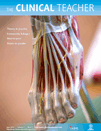
Clinical Teacher
Transforming Teaching Practices in HealthcareThe Clinical Teacher is a leading journal published by WILEY, dedicated to fostering excellence in medical education and enhancing the skills of healthcare educators. With an ISSN of 1743-4971 and an E-ISSN of 1743-498X, this esteemed publication has gained recognition for its practical insights and innovative approaches, particularly in the realms of Teaching and Assessment within the medical field. Since its inception in 2006, it has maintained a notable impact within its categories, ranking Q3 in Medicine (miscellaneous) and an impressive Q1 in Review and Exam Preparation as of 2023. The journal's commitment to advancing educational practices is reflected in its exceptional Scopus ranking of #1 in the Nursing Review and Exam Preparation category, placing it in the 87th percentile of its peers. Although not open access, The Clinical Teacher serves as an invaluable resource for researchers, educators, and healthcare professionals focused on improving the learning experiences of future medical practitioners. With continued contributions from eminent figures in the field, this journal stands as a vital platform for the dissemination of knowledge and the evolution of teaching methodologies in clinical settings.

International Electronic Journal of Mathematics Education
Innovating the Future of Mathematics Learning and TeachingInternational Electronic Journal of Mathematics Education (IEJME) is a premier platform dedicated to advancing the field of mathematics education through rigorous research and innovation. Published by MODESTUM LTD, this interdisciplinary journal focuses on the pedagogical, theoretical, and empirical aspects of mathematics education, facilitating a deep understanding of teaching practices, learning methods, and curriculum development. With its commitment to open access, IEJME ensures that research findings are accessible to a global audience, fostering collaborative efforts among educators, researchers, and practitioners. The journal has maintained a commendable position in academic rankings, holding a Rank of #114/399 in General Mathematics and #782/1543 in Education within Scopus, highlighting its significant contribution to the scholarly community. By publishing high-quality research from 2009 to 2016 and 2021 to 2024, IEJME continues to serve as an essential resource for those invested in enhancing mathematical understanding in educational contexts, inspiring future generations of mathematicians and educators.
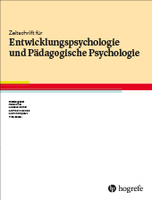
ZEITSCHRIFT FUR ENTWICKLUNGSPSYCHOLOGIE UND PADAGOGISCHE PSYCHOLOGIE
Advancing Knowledge in Developmental and Educational PsychologyZEITSCHRIFT FUR ENTWICKLUNGSPSYCHOLOGIE UND PADAGOGISCHE PSYCHOLOGIE, published by HOGREFE VERLAG, is a pivotal academic journal based in Germany that focuses on the intricate fields of developmental and educational psychology. With an emphasis on innovative research and the latest theoretical developments, this journal aims to bridge the gap between psychological theory and educational practice. It holds a commendable Q3 ranking in Developmental and Educational Psychology and an impressive Q2 ranking in the broader field of Education, underscoring its relevance and contribution to the academic discourse. Although it does not currently offer Open Access options, the journal continues to provide substantial insights and findings that are crucial for researchers, educators, and students alike, thereby fostering advancements in both psychological research and educational methodologies. Spanning topics from childhood development to pedagogical strategies, this journal serves as an essential platform for disseminating knowledge within these interconnected fields.

LANGUAGE LEARNING & TECHNOLOGY
Unlocking New Possibilities in Language EducationLANGUAGE LEARNING & TECHNOLOGY, published by the University of Hawaii's National Foreign Language Resource Center, stands as a pioneering platform within the realms of linguistics, education, and computer science applications. With an impressive impact factor and esteemed rankings—achieving Q1 in Education and Q1 in Linguistics and Language—this open-access journal has been disseminating critical research since its inception in 1997. The journal operates under a commitment to fostering innovative approaches to language learning through technology, making it invaluable for researchers, educators, and practitioners seeking to enhance their understanding of this dynamic intersection. Hailing from the United States, the journal not only promotes scholarly dialogue but also champions accessibility to knowledge, ensuring that the latest advancements in language learning and technology are readily available to a global audience. With converged years documented from 1997 to 1998 and from 2000 to 2021, LANGUAGE LEARNING & TECHNOLOGY continues to play a pivotal role in shaping contemporary discussions around language education and the influence of technology on learning methodologies.
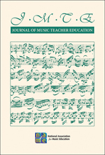
Journal of Music Teacher Education
Navigating the Evolving Landscape of Music Education.The Journal of Music Teacher Education, published by SAGE Publications Inc, is a leading scholarly outlet dedicated to advancing the field of music education. With an ISSN of 1057-0837 and an E-ISSN of 1945-0079, this journal explores a wide array of topics pertinent to music teaching and learning, serving as a vital resource for both researchers and practitioners in the music education community. Since its inception in 1991, it has consistently been positioned among the top-tier journals in both music and education, achieving a notable Q1 ranking in music and Q2 in education as of 2023. With impressive Scopus rankings, placing it in the 89th percentile for music and 47th percentile for education, the journal plays a crucial role in facilitating dialogue and disseminating innovative research aimed at improving music pedagogy. While not an open-access publication, it provides access to invaluable insights and practices that inform both theory and application in music education, making it an essential read for educators, students, and researchers alike, as they navigate the evolving landscape of music teaching. Explore the latest findings and thought-provoking discussions that shape the future of music education in the United States and beyond.

English Teaching and Learning
Exploring New Horizons in English Teaching MethodologiesEnglish Teaching and Learning is a distinguished academic journal published by SPRINGER SINGAPORE PTE LTD, focusing on the dynamic fields of education and linguistics. With an ISSN of 1023-7267 and an E-ISSN of 2522-8560, this journal serves as a vital platform for researchers, educators, and practitioners interested in advancing the understanding of English language instruction and learning methodologies. Recognized for its high standards, it has achieved a notable Q2 ranking in Education and a prestigious Q1 ranking in Linguistics and Language in 2023, underscoring its impact within these essential scholarly fields. The journal, which spans a converged publication period from 2015 to 2024, endeavors to disseminate innovative research, theoretical insights, and practical applications, making it an invaluable resource for anyone committed to enhancing English education globally. Although it does not operate under an open-access model, its contributions are pivotal in shaping contemporary discourse in English teaching and learning.

International Journal for Academic Development
Empowering academic innovation for a brighter future.The International Journal for Academic Development, published by Routledge Journals, Taylor & Francis Ltd, is a leading scholarly platform dedicated to advancing the field of education. With an ISSN of 1360-144X and an E-ISSN of 1470-1324, this esteemed journal has garnered attention for its profound contributions, illustrated by its position in the Q2 category of the Education sector for the year 2023, and an impressive ranking of #380 out of 1543 in Scopus Ranks, placing it in the 75th percentile. The journal serves as a vital resource for researchers, professionals, and students who are engaged in academic development and pedagogical innovation from 2010 through 2024. While currently not an open access journal, it remains instrumental in disseminating impactful research aimed at shaping teaching practices and enhancing educational quality across diverse contexts. Set against the backdrop of its U.S. publication in Abingdon, England, the journal’s commitment to fostering a collaborative academic environment continues to attract a wide readership keen on exploring new educational paradigms.
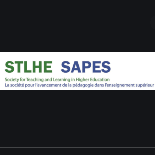
Canadian Journal for the Scholarship of Teaching and Learning
Fostering a Community of Teaching and Learning ScholarsThe Canadian Journal for the Scholarship of Teaching and Learning (CJSoTL) is a premier open-access journal dedicated to advancing research and discourse in the field of teaching and learning within higher education. Published by SOC TEACHING & LEARNING HIGHER EDUCATION, CJSoTL serves as a vital resource for educators, researchers, and students alike, promoting evidence-based practices and scholarship in higher education pedagogy. Since its inception in 2010, the journal has provided an inclusive platform for innovative research, case studies, and pedagogical strategies that enhance teaching effectiveness and student learning outcomes. Although specific metrics such as H-index and Scopus ranks are currently unlisted, the journal is committed to fostering a community of practice among scholars dedicated to improving teaching and learning environments. With its open-access policy, CJSoTL ensures that valuable knowledge is freely available, aligning with contemporary trends in academic dissemination and accessibility, thus making significant contributions to the scholarship of teaching and learning in Canada and beyond.

REDU-Revista de Docencia Universitaria
Connecting Researchers and Educators for Impactful ChangeREDU-Revista de Docencia Universitaria, published by UNIV POLITECNICA VALENCIA, EDITORIAL UPV, is a prominent open-access journal dedicated to advancing the field of higher education pedagogy. Established in 2008, this journal serves as a vital platform for academics and educators to share insightful research and innovative practices aimed at improving university teaching and learning. With a commitment to fostering educational excellence, REDU promotes a rich dialogue among researchers, professionals, and students across various disciplines. The journal is indexed by notable databases, ensuring wide visibility and accessibility of published works. By addressing contemporary challenges and developments in university instruction, REDU plays a crucial role in shaping educational methodologies and informing policies within the academic landscape.
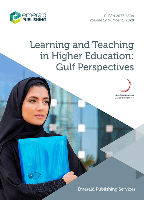
Learning and Teaching in Higher Education-Gulf Perspectives
Transforming Higher Education Through Open Access KnowledgeLearning and Teaching in Higher Education - Gulf Perspectives is a premier Open Access journal published by Emerald Group Publishing Ltd, dedicated to advancing knowledge in the field of education, particularly within the context of higher education in the Gulf region. Since its inception in 2004, the journal has provided a vital platform for scholarly discourse, catering to an audience that includes researchers, educators, and policymakers. With an impressive Scopus ranking, placing it in the top 30% of education journals, and a Q3 quartile classification, it consistently publishes rigorous research and innovative practices that aim to influence educational strategies and contribute to the quality of higher education. The journal supports Open Access, ensuring that research findings are readily available to the wider academic community and the public, thereby fostering informed dialogue and collaboration across disciplines. By bridging local educational insights with global trends, Learning and Teaching in Higher Education - Gulf Perspectives stands as a crucial resource for those committed to improving educational outcomes in the region and beyond.